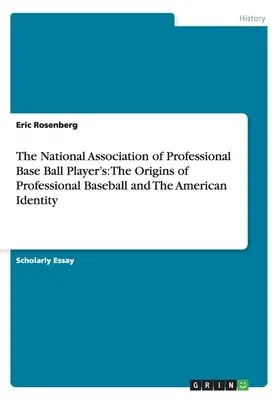Scientific Essay from the year 2011 in the subject History -
Miscellaneous, grade: 93.00, Vanderbilt University, language: English,
abstract: With almost utmost certainty, the sun will rise in the east,
set in the west, and Major League Baseball will begin a new season in
the spring. Such has been assured since 1871, as professional baseball
first complemented everyday American life by virtue of the National
Association of Professional Base Ball Player's (NAPBBP) inaugural
season. The formation of the NAPBBP denoted a fundamental separation of
amateur and professional baseball clubs, and the eternal intertwining of
sport and business. This moment in history would more broadly beget a
critical juncture in the development of the modern American identity as
this era of the nineteenth century is characterized by a generation of
citizens who have only known an autonomous United States, thereby
distinguishable as the first purely born and bred American population.
With this new status came the need to comprehend what constituted wholly
American values beyond just regional, economic, and social distinctions,
the remnants of a fractious colonial past. Baseball quickly became part
of this new sense of American similitude, labeled the "national pastime"
for nearly its entire existence. As baseball grew from a regional game
into a nationwide phenomenon, more drastic change accompanied, by means
of money permeating the sport. The five seasons of NAPBBP play from 1871
to 1876 transpired during a decidedly dynamic period of American
history. The societal identity formation occurring during the early
stages of the Gilded Age corresponds both in time, and essence, with
baseball's maturation process, culminating in a purely professional
NAPBBP. Through analyzing these simultaneous processes, their relation
to one another, and the notion of baseball as a microcosm of American
society, what characteristics became inherently American, who had the
power to actually establish these alle


